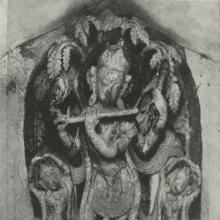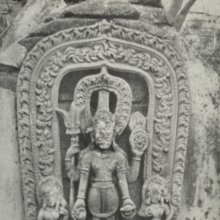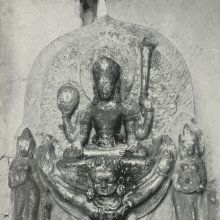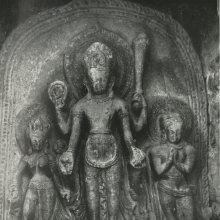Deo: 1 definition
Introduction:
Deo means something in biology. If you want to know the exact meaning, history, etymology or English translation of this term then check out the descriptions on this page. Add your comment or reference to a book if you want to contribute to this summary article.
Images (photo gallery)
Biology (plants and animals)
Source: Google Books: CRC World Dictionary (Regional names)Deo in Liberia is the name of a plant defined with Xylopia aethiopica in various botanical sources. This page contains potential references in Ayurveda, modern medicine, and other folk traditions or local practices It has the synonym Xylopicrum aethiopicum Kuntze (among others).
Example references for further research on medicinal uses or toxicity (see latin names for full list):
· Historia Fisica Politica y Natural de la Isla de Cuba, Botanica (1845)
· Pl. Bequaert. (1922)
· Fitoterapia (2003)
· African Journal of Biotechnology (2008)
· Journal of Ethnopharmacology (2011)
· Journal of Ethnopharmacology (2001)
If you are looking for specific details regarding Deo, for example side effects, diet and recipes, health benefits, chemical composition, extract dosage, pregnancy safety, have a look at these references.

This sections includes definitions from the five kingdoms of living things: Animals, Plants, Fungi, Protists and Monera. It will include both the official binomial nomenclature (scientific names usually in Latin) as well as regional spellings and variants.
See also (Relevant definitions)
Starts with (+10): Deo kapus, Deo tara, Deo-babool, Deo-dhan, Deo-ghar, Deo-jokhola, Deo-mardon, Deo-sanrh, Deobahari, Deobhaatha, Deobhata, Deobih, Deodaar, Deodar, Deodar cedar, Deodar pine, Deodari, Deodaru, Deodhai, Deodhan.
Ends with: Bhideo, Ghar-Deo, Ghardeo, Kokumbrindeo, Pha-mahadeo.
Full-text: Deo kapus, Deo-babool, Deo-mardon, Deo-dhan, Deo-jokhola, Deo-sanrh, Deo tara, Ishvaradatta, Nagarabhukti, Ghar-Deo, Deo-ghar, Mathura, Bhukti, Deva.
Relevant text
Search found 20 books and stories containing Deo; (plurals include: Deos). You can also click to the full overview containing English textual excerpts. Below are direct links for the most relevant articles:
The Tattvasangraha [with commentary] (by Ganganatha Jha)
Verse 43 < [Chapter 1 - Examination of the Doctrine of Primordial Matter (prakṛti)]
Chaitanya Bhagavata (by Bhumipati Dāsa)
Verse 1.6.12 < [Chapter 6 - The Lord Begins Studying and His Childhood Mischief]
Settlement in Early Historic Ganga Plain (by Chirantani Das)
Part 2 - Resource area of the Aṅga-Magadha region < [Conclusion]
Part 5 - Glass industry of the Vārāṇasī region < [Chapter VI - Vārāṇasī: Emergence of the Urban Centre and Seat of Administration]
Part 6 - Urban centres in South Bihar (c): Pāṭaliputra Circle < [Chapter I - The Case Study of Rājagṛha]
Parables of Rama (by Swami Rama Tirtha)
Story 190 - The story of devotee child - Nam Deo < [Chapter XXXIII - Will-force]
Sripura (Archaeological Survey) (by Bikash Chandra Pradhan)
Vernacular architecture of Assam (by Nabajit Deka)
Mising Vernacular Architecture < [Chapter 6]
Tiwa Vernacular Architecture < [Chapter 7]
Tiwa Dormitory: Chamadi < [Chapter 8]
Related products




